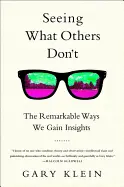
Seeing What Others Don't - by Gary Klein
ISBN: 1610392515Date read: 2014-11-10
How strongly I recommend it: 0/10
(See my list of 430+ books, for more.)
Go to the Amazon page for details and reviews.
I really wanted to like this book, but couldn't stomach the writing style. Instead of presenting his conclusions, you have to slog forever through his tales of how he went about his research, and how he felt about each step along the way to writing this book. I couldn't finish it.
my notes
The fancy new BMW in front of them: The driver took a long drag on his cigarette, took it out of his mouth, and flicked the ashes onto the upholstery. “Did you see that? He just ashed his car,” the younger cop exclaimed. He couldn’t believe it. “That’s a new car and he just ashed his cigarette in that car.” That was his insight. Who would ash his cigarette in a brand new car? Not the owner of the car. Not a friend who borrowed the car. Possibly a guy who had just stolen the car.
A refreshing antidote to all the depressing tales in the popular press about how irrational and biased we can be.
Positive psychology applied to decision making as well. Decision researchers were trying to reduce errors, which is important, but we also needed to help people gain expertise and make insightful decisions.
A sudden discovery, a jolt of excitement, a combination of ideas that fit tightly together, a feeling of confidence in the new direction. And no one else has the insight, despite receiving the same information. These cues tell us that an insight has just appeared.
“Insight is when it happens, everything that happens afterward is different.”
Grownups often narrow our attention to what matters most to us. Babies aren’t as good at attending to just one thing but seem to be more alert to anything unexpected.
We can increase insights by exposing ourselves to lots of different ideas that might help us form new connections.
Events that seem related to each other even though they don’t seem to have any obvious causal link. Coincidences are chance concurrences that should be ignored except that every so often they provide us with an early warning about a new pattern.
The greatest obstacle to knowledge is not ignorance; it is the illusion of knowledge.
Curiosities make us wonder what’s going on, whereas contradictions make us doubt—“That can’t be right.”